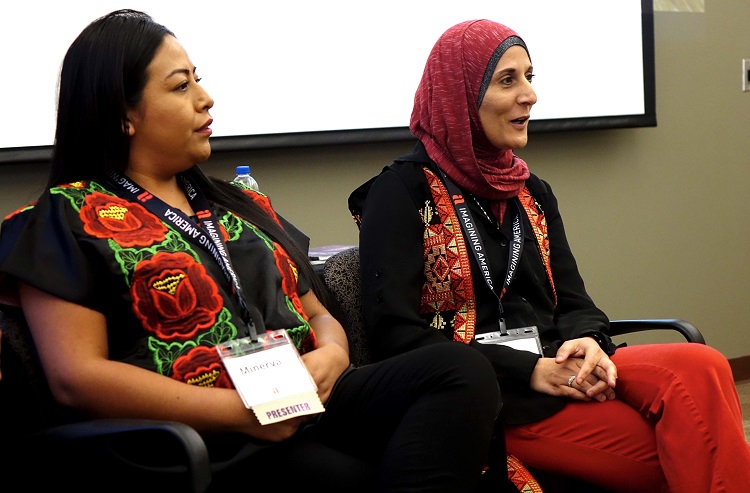On October 18-20, Pan Valley Institute staff and community members traveled to Albuquerque to facilitate a roundtable discussion at the Imagining America 20th Anniversary National Gathering entitled “Mighty Dreams: Designing and Fostering Belonging in the U.S.” This annual event brings together public scholars, artists, students, designers, and cultural organizers who are addressing the nation’s most critical issues.
PVI’s roundtable discussion, The California’s Central Valley Stories of Migration and Belonging, exposed factors that influence identity and sense-of-belonging formation. Panelists Wasan Abu-Baker, Palestinian; Juan Santiago, Zapotec, DACA recipient; and PVI Program Associate Minerva Mendoza, Mixtec, are three immigrants who arrived in the U.S. under dissimilar circumstances. (Note: Zapotec and Mixtecs are two of the sixteen indigenous groups from the state of Oaxaca, Mexico.)
They shared how their history of migration and legal status has influenced their sense of place and belonging formation. PVI Program Director Myrna Martinez N opened the discussion by talking about the intersection of political engagement, identity, sense of place and belonging that PVI has gained over 20 years of working with immigrants and refugees.
Minerva
Minerva shared what a sense of belonging means for mixt status families. Minerva’s family migrated to the U.S. from Santa Maria Tindu, a town located in the Mixteca region of Oaxaca Mexico. Minerva’s father migrated to California in 1978, and he obtained his residency through the Immigration Reform and Control Act (IRCA) of 1986. Years later, he brought his oldest son when he was only 13 years old. In 2001, Minerva, a sister and one brother joined the father and oldest brother.
In this family, the parents feel that they belong to two places because, even though they have been living in the USA for so many years, they have deep connections with their hometown. They own land and have been able to travel frequently to keep their memories of home alive.
Just this summer, the oldest son obtained his residency, which greatly changed the way he now connects to the US. Before becoming a resident, he was living in the margins and trying to go undetected, yet he was actively contributing and making investments back home. Now that he has a green card, he is talking about contributions and investments in this country.
“Like my father I have a dual sense of belonging,” Minerva said. “I have love, concerns, hopes and care for the wellbeing of my communities on both sides of the border. I am equally invested in what happens here, where I have lived for more than half of my life, and in the land where I was born and raised.”
Juan
Juan Santiago talked about how the sense of belonging looks different across the first, 1.5 and second generations. People in the first generation are the parents who have no immigration relief and limited or no formal education. They work mostly in the fields, have low salaries, and are bilingual in Spanish and Indigenous languages. They are cultural practitioners and hold the knowledge of indigenous traditions.
Juan shared a photo of a driver’s license marked with the words “Federal Limits Apply” that most members of the first generation have; this illustrates how systems of dis-belonging operate. Juan asked the audience, “Would you feel that you belong to this country while carrying every day a marked drivers license?” Despite the fact that the first generation does not feel welcome, they create their own spaces of belonging by organizing their annual Fiesta del Pueblo (hometown annual celebration gatherings) or Guelaguetzas.
People in the 1.5 generation are the dreamers, many of whom, like Juan, are tri-lingual, speaking Zapotec, Spanish and English. They have some college education and live in two worlds. This generation is more integrated and feels more attached to the U.S. yet they still hold memories of their cultural roots and are interested in obtaining cultural and traditional knowledge from the first generation.
People in the second generation, children born in the U.S., could be bilingual or monolingual. They could have the strongest sense of belonging in the U.S. because they speak English and have no attachment to their parents’ homeland. Nevertheless, this generation experiences identity issues, and it remains to be seen how they will develop their sense of belonging.

Minerva Mendoza, left, and Wasan Abu-Baker (photos: Eduardo Stanley)
Wasan
Wasan Abu-Baker talked about the struggles Palestinian people have to endure to build a life in this country and the resilience they have. She discussed the impact that 9/11 has had in the Muslim community. When she came to the U.S., she decided to keep wearing the Hijab as a defiant act to give people the opportunity to ask questions and learn what the Islamic religion is about.
Oralia
PVI also facilitated the participation of Oralia Macedo, Binational Women’s Coordinator of the Frente Indigena de Organizaciones Binacionales (FIOB) at the closing panel of Imagining America’s annual gathering. Oralia spoke about migrant/immigrant/refugee organizing across borders. The broader theme of the panel looked at intersections between Indigenous organizing, migration, and climate justice. The broad question addressed by panelists was, “How can we be good ancestors and relatives?”